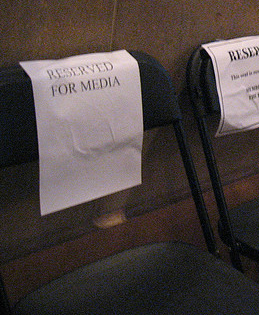Who is a Journalist? Here We Go Again…
Citizen Media Law Project 2013-05-24
Summary:
 In the wake of the Associated Press and James Rosen incidents, the call for statutory protection for journalists and their sources has started anew. The Obama administration has called on Sen. Chuck Schumer to re-introduce a federal media shield law, reviving a concept which floundered in 2009 in the wake of the Wikileaks disclosures and raising questions over the sufficiency of that proposal. Just as in 2009, one of the issues that will inevitably be raised is the question of who will receive the protection of such a law. This question is well known to those who practice media and Internet law as the “who is a journalist?” problem. But this is – and in some ways always has been – the wrong question.
In the wake of the Associated Press and James Rosen incidents, the call for statutory protection for journalists and their sources has started anew. The Obama administration has called on Sen. Chuck Schumer to re-introduce a federal media shield law, reviving a concept which floundered in 2009 in the wake of the Wikileaks disclosures and raising questions over the sufficiency of that proposal. Just as in 2009, one of the issues that will inevitably be raised is the question of who will receive the protection of such a law. This question is well known to those who practice media and Internet law as the “who is a journalist?” problem. But this is – and in some ways always has been – the wrong question.
The “who is a journalist?” problem has been with us for quite a while. The great Supreme Court defamation cases of the post-Sullivan/pre-Internet era were largely fought by the institutional media, and this is often reflected in the language of the Court. For example, in Philadelphia Newspapers, Inc. v. Hepps, the critical 1986 First Amendment ruling stating that plaintiffs have the burden to prove falsity in defamation actions, the Court held specifically that:
[T]he need to encourage debate on public issues … is of concern … in this case involving a private suit for damages: placement by state law of the burden of proving truth upon media defendants who publish speech of public concern deters such speech because of the fear that liability will unjustifiably result. ... Because such a "chilling" effect would be antithetical to the First Amendment's protection of true speech on matters of public concern, we believe that a private-figure plaintiff must bear the burden of showing that the speech at issue is false before recovering damages for defamation from a media defendant.
475 U.S. 767 at 777 (emphasis added). Clearly, the Court associated “debate on public issues” with the function of the media, and so focused its holding on the particular institutional media defendant before it. But the Court explicitly did not reach the issue of nonmedia defendants, id. at 779 n. 4, and Justice Brennan, in his concurrence, wrote separately to emphasize that
such a distinction is irreconcilable with the fundamental First Amendment principle that the inherent worth of speech in terms of its capacity for informing the public does not depend upon the identity of the source, whether corporation, association, union, or individual.
Id. at 780 (internal quotation marks omitted).
And that, exactly, is the issue. When considering whether to grant legal protection for the gathering and dissemination of information, the question should not be the person performing those acts, i.e., “who is a journalist?,” but “is this an act of journalism?” Before the user-generated content revolution, focusing on journalists (i.e., people defined by their institutional affiliations) served as a functional if rough approximation of the true interests at stake (i.e., debate on issues of public concern). That is no longer the case.
Professional journalists play a critical role in our society. The majority of information of local, national and global importance is still (and, barring seismic shifts in communication, will continue to be) gathered and reported first by those who have dedicated their education and careers to the practice of journalism. Professional journalists have skill in parsing information and providing context that most others lack. Regardless of whether they practice in corporate organizations or independently, professional journalists deserve and require all of the legal protections that they have for these tasks.
But professional journalists now share the information ecology with a much wider array of members of the public who care about particular communities and issues. These individuals can often speak from deep personal knowledge and identify important information that others might miss. And from the Rodney King incident forward, there has been recognition that sometimes informing the public is not about education and professional commitment, but about being in the right place at the right time. Institutional media
Link:
http://feedproxy.google.com/~r/CitizenMediaLawProject/~3/rC8JLwYB90A/who-journalist-here-we-go-again%E2%80%A6Updated:
05/24/2013, 13:46From feeds:
Fair Use Tracker » Current Berkman People and ProjectsBerkman Center Community - Test » Citizen Media Law Project